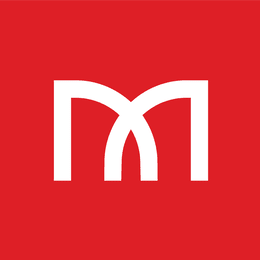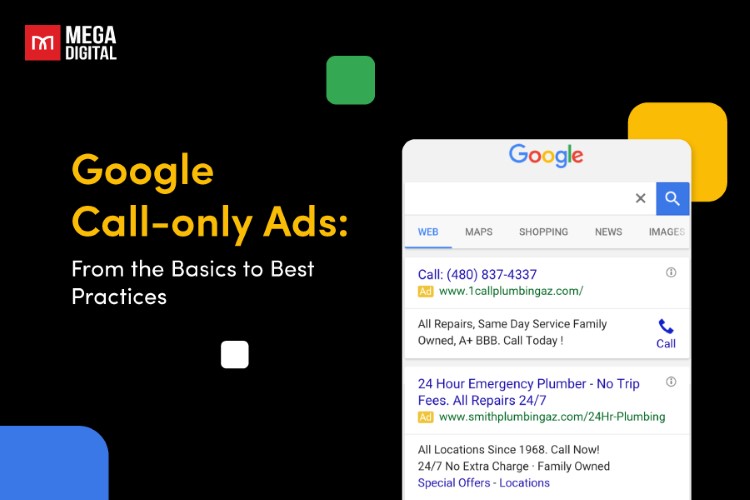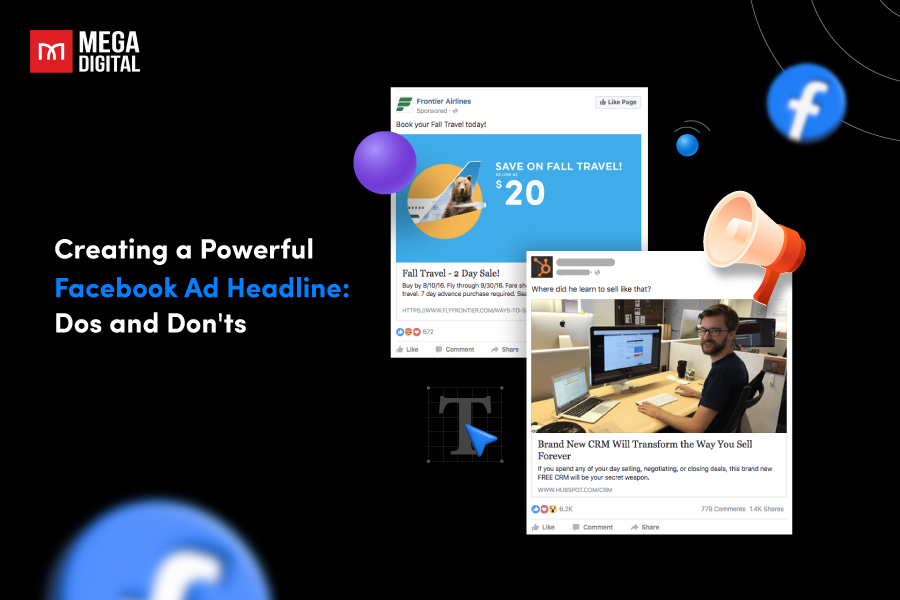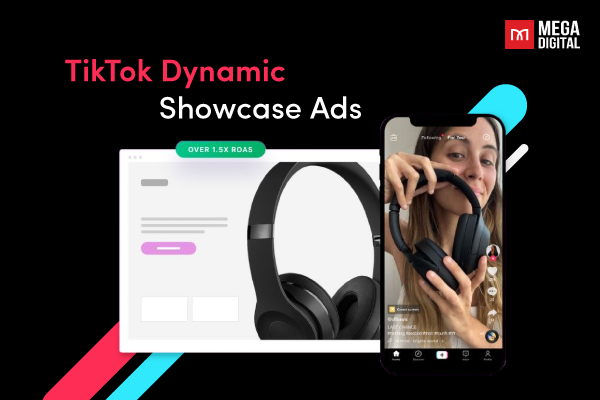If you’re currently running ads on Facebook and you are finding that your Facebook ads are not generating leads, don’t freak out! This is a common issue that many advertisers face. The key is to identify the causes and make adjustments to get your ads back on track. In this blog, you will find the reasons why it happened in the first place, and know the solution to fix that issue.
How to Tell if Facebook Ads Are Not Generating Leads?
Before diving into the potential issues causing low lead generation, it’s essential to identify and confirm that your Facebook ads are indeed underperforming.
You can easily tell that your Facebook Ads aren’t generating leads by looking at the “Leads” column inside Facebook Ads Manager.
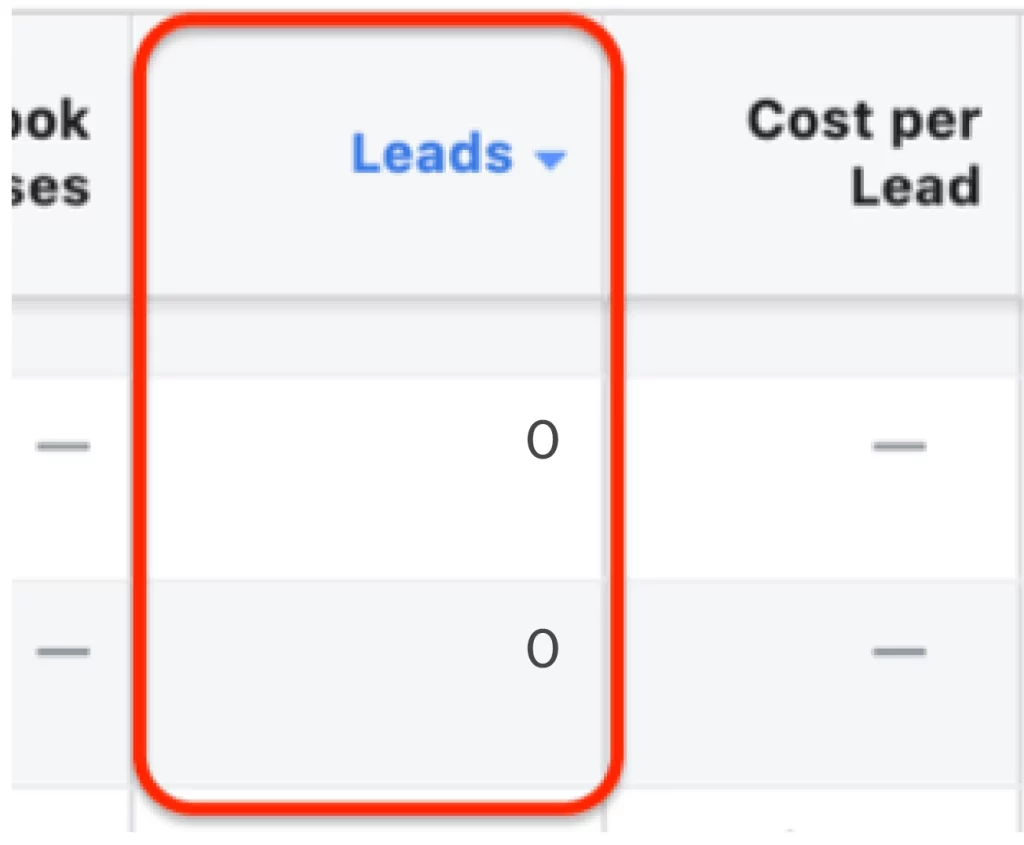
Additionally, if you notice high impressions but few clicks, it indicates that users are not interested enough to engage with your ad.
Consequences of Facebook Ads Not Generating Leads
When your Facebook ads aren’t generating leads, it can have a ripple effect on multiple aspects of your marketing strategy and overall business goals:
Wasted ad spend
When your ads don’t generate leads, you’re essentially throwing money away on ineffective campaigns. This can quickly deplete your marketing budget without achieving any return on ad spend (ROAS).

As a result, you may be forced to reduce ad spending, limiting your ability to reach potential customers and potentially making it harder to justify future investments in Facebook advertising.
Low ROAS
A low ROAS indicates that your advertising dollars aren’t bringing in the expected revenue. This suggests that either the targeting, creative, or overall campaign strategy is flawed.
If you continue running campaigns with low ROAS, you risk losing profitability and may need to rethink your entire advertising approach, including exploring other marketing channels to generate leads.
Missed business opportunities
Every lead you fail to capture is a potential customer you’re losing to competitors. Without new leads entering your sales funnel, your pipeline dries up, making it difficult to meet sales targets and grow your business.

Over time, this lack of new business can reduce your company’s revenue, hinder expansion plans, and even damage your market position.
Difficulty scaling campaigns
If your current campaigns aren’t generating leads, you lack a strong foundation to build upon. Attempting to scale such campaigns by increasing ad spend or targeting a broader audience will likely result in even more wasted budget.
This makes it challenging to scale your campaigns efficiently, preventing you from reaching new customers and maximizing your advertising potential.
7 Reasons Why Facebook Ads Not Generating Leads (& Solutions)
If your Facebook ads aren’t converting into leads, you’re not alone. Even experienced advertisers face challenges when campaigns fail to deliver results.
In most cases, the problem stems from common issues that can be easily fixed with the right strategies.
Let’s dive into the top 7 reasons why your Facebook ads are not generating leads and how to resolve each issue effectively.
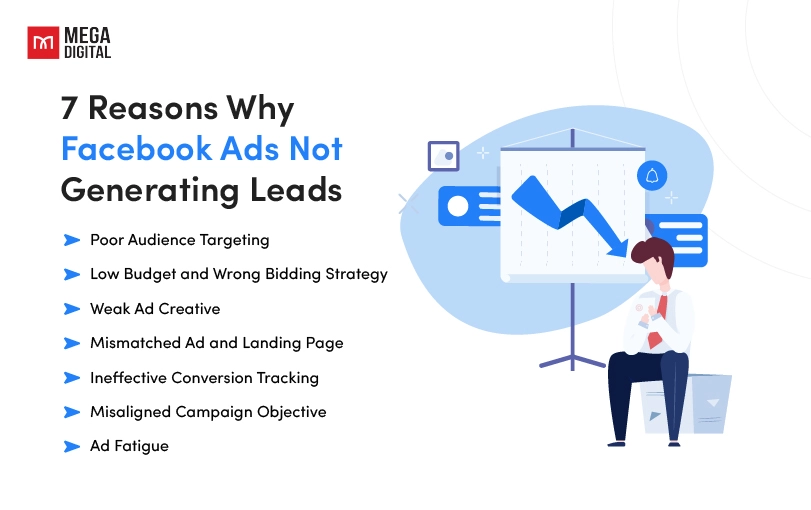
1. Poor Audience Targeting
If your audience targeting is too broad or too narrow, your ads may not reach people who are genuinely interested in your product or service.
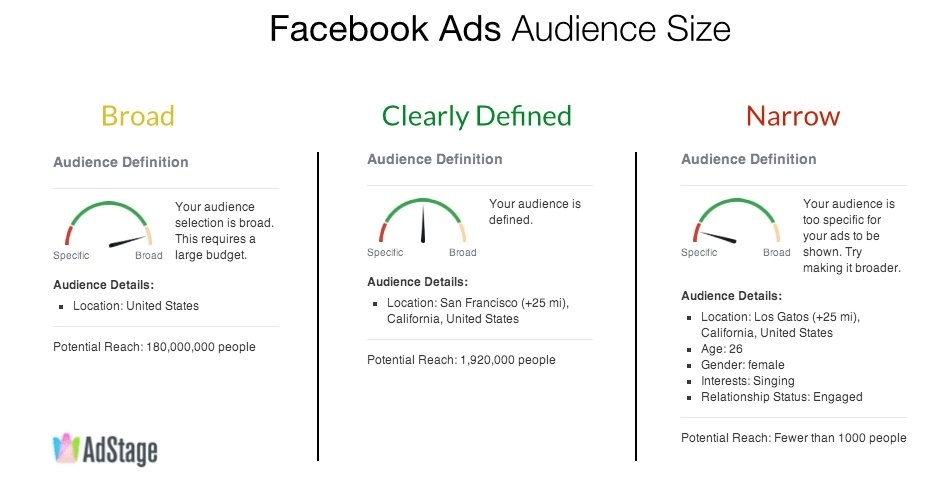
Casting too wide a net can waste your ad budget on users who aren’t in your target market. Conversely, targeting too narrowly can result in low reach and a lack of engagement.
Solution: Use detailed targeting options based on your buyer personas. Segment your audiences based on engagement and retarget them with specific offers.
For example, people who viewed a product page but didn’t convert might respond better to an offer-focused ad.
2. Low Budget and Wrong Bidding Strategy
Having a budget that’s too low can limit your reach and reduce the frequency of your ads, meaning fewer people see your offer.
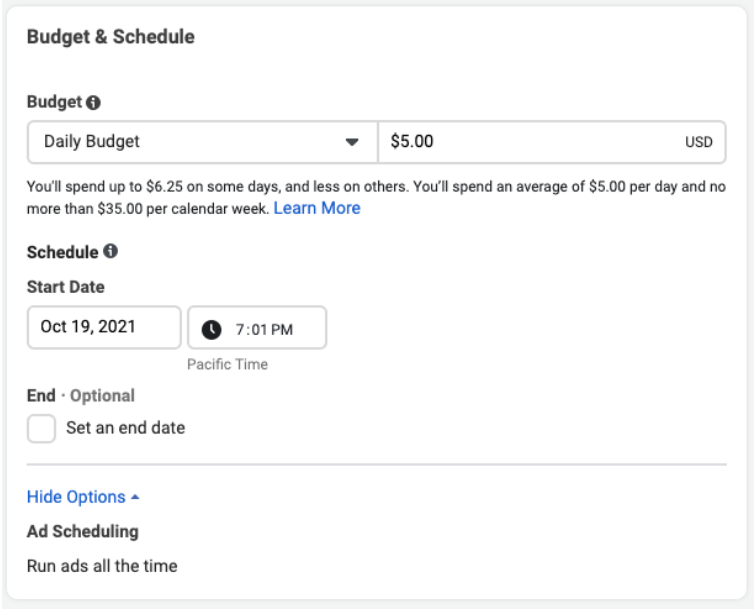
On the other hand, if your bid strategy isn’t aligned with your campaign goals, your ads might not be shown to people who are most likely to convert.
Solution: Set a budget that allows you to get enough impressions and conversions. Start with a daily budget that can get at least 50 conversions per week to exit the learning phase.
If, after adjustments, you find that your ads are still generating low or no leads, it might be that your ad itself isn’t click-worthy, which is another reason I’m going to discuss next.
3. Weak Ad Creative
Facebook is a very visual platform and you’ll want to make sure that your ads are good at catching the eyes of your custom audience.
If your ad is poorly designed or your messaging is unclear, people will simply scroll past without engaging.
Take a look at this ad example:
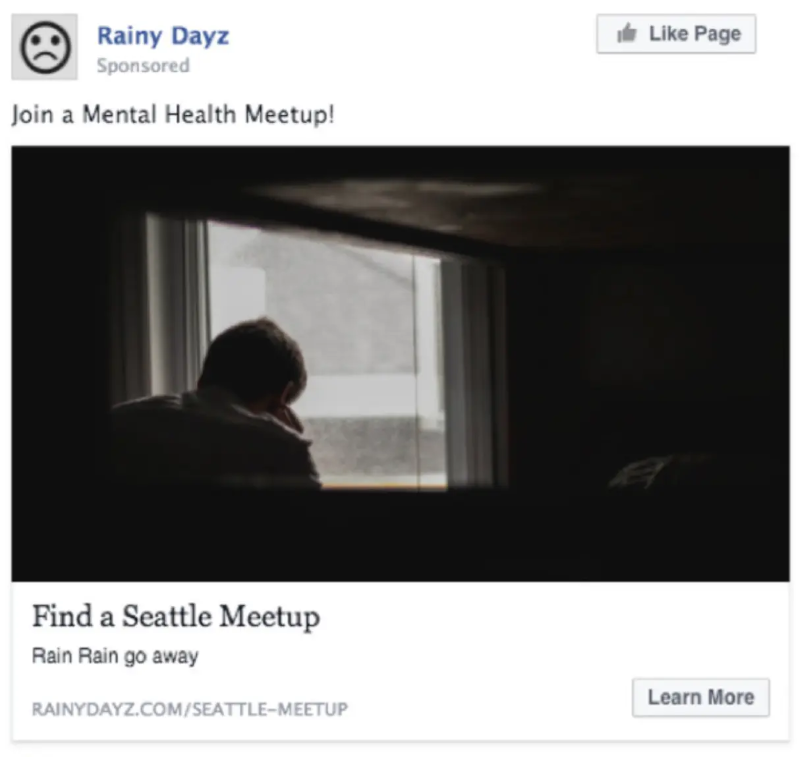
The ad clearly lacks an explanation of why someone should join a mental health meetup. It should be explicitly stated to ensure the message is clear to readers.
Additionally, the call-to-action is too vague. Using phrases like “Find a meetup” or “Join a meetup” would more effectively guide readers towards the intended action.
Solution: Ensure your ad copy highlights a clear benefit, addresses a pain point, and ends with a strong call-to-action (CTA). Use Facebook’s split testing feature to identify high-performing creatives.
4. Mismatched Ad and Landing Page
A major reason for low lead generation is a lack of alignment between the ad and the landing page.
When a user clicks on an ad, they’re looking to learn more about what caught their interest.
If your ad promises one thing but the landing page delivers something different, or doesn’t align with their intent, visitors will feel misled and leave without taking any action.
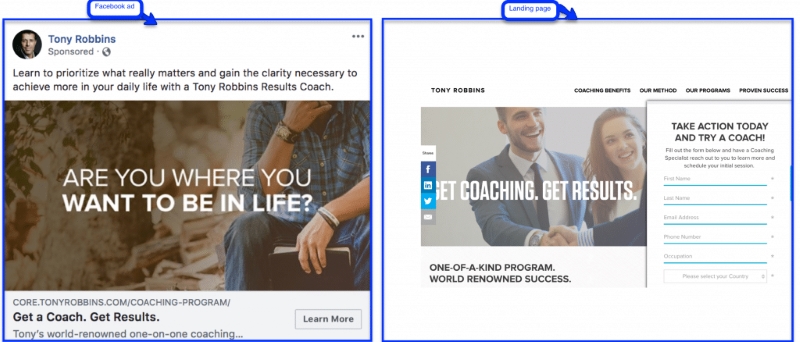
Solution: Ensure the message, visuals, and offer are consistent from ad to landing page. Your landing page should have a clear value proposition, a compelling CTA, and a user-friendly form to capture leads.
5. Ineffective Conversion Tracking
Without proper tracking, Facebook’s algorithm won’t know which users are converting, making it nearly impossible to optimize your campaign effectively.
If your Facebook Pixel isn’t configured correctly or your conversion events aren’t set up, you’re missing out on valuable data.
Solution: Check if your Facebook Pixel and conversion events are set up correctly. Use the Event Setup Tool to ensure all key actions (form submissions, button clicks) are tracked.
6. Misaligned Campaign Objective
The campaign objective you choose has a direct impact on how Facebook optimizes your ads.
For example, if you’re a hotel owner and you use objectives like ‘Brand awareness’ or ‘Engagement’ instead of ‘Lead Generation,’ your ads may get clicks and interactions but not necessarily convert into leads.
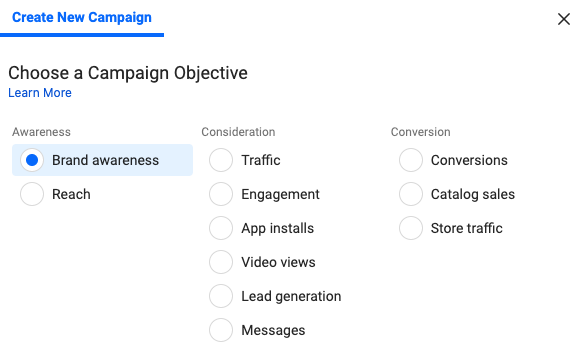
Solution: Always align your campaign objective with your end goal. If lead generation is the priority, opt for the ‘Lead Generation’ objective and use native forms to collect leads directly on Facebook.
7. Ad Fatigue
If your target audience has seen the same ad too many times, they may start ignoring it, leading to lower engagement and no leads. Ad fatigue can result in a higher cost per lead and poor campaign performance.

Solution: Monitor your frequency metrics and update creatives regularly. Consider setting up a frequency cap or rotating multiple ad versions.
How to Optimize Facebook Ads for Better Lead Generation?
Once your ads finally break free from the ‘0 leads’ zone, the next step is to maximize their lead-generating potential. So, how can you make that happen?
Analyze and Test Different Ad Elements
Start by A/B testing different ad elements like visuals, headlines, and call-to-action buttons to see which combinations perform best.

This helps identify what resonates most with your audience and drives more leads.
Leverage Advanced Audience Targeting
Utilize Facebook’s Custom Audiences and Lookalike Audiences to refine your targeting.
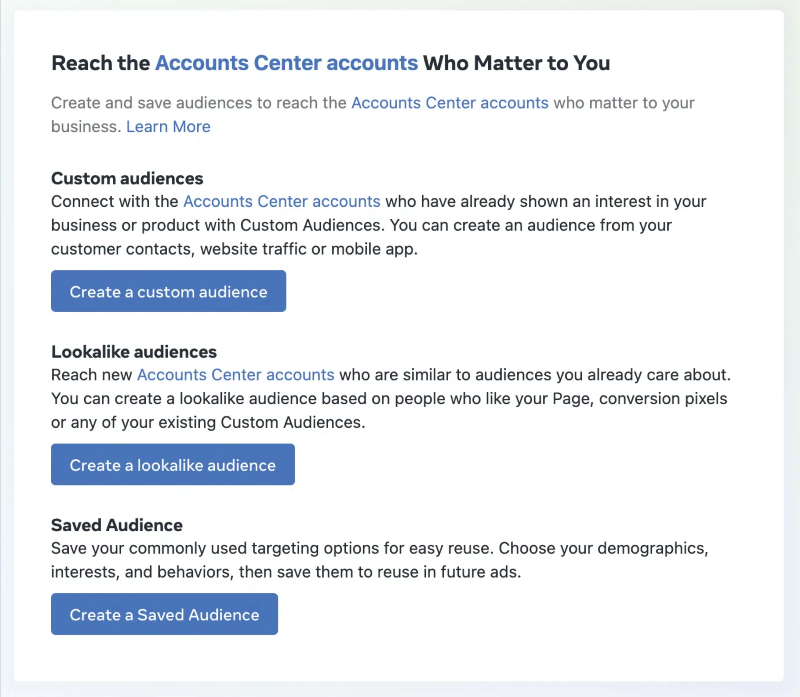
Reach people who have engaged with your brand before, and find new leads that resemble your best-performing audience segments.
Use Facebook Pixel for Continuous Optimization
Implement the Facebook Pixel to track on-site actions and gather valuable data. Use these insights to optimize your bidding strategies, ad placements, and targeting, making adjustments as you learn more about your audience’s behavior and preferences.
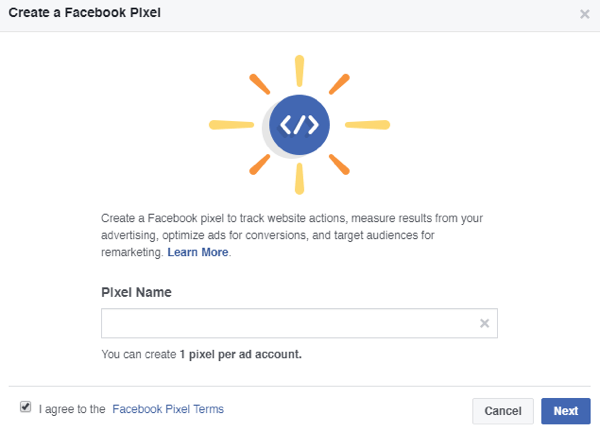
Wrap-up
Facebook ads can be a highly effective tool for lead generation, but achieving success requires thoughtful planning, continuous testing, and strategic optimization. If your Facebook ads are not generating leads, it’s important to identify the cause and resolve the issue as soon as possible. I hope this guide helps you find the solutions you need!
